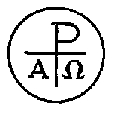
FAIR is a non-profit organization dedicated to providing well-documented answers to criticisms of the doctrine, practice, and history of The Church of Jesus Christ of Latter-day Saints.
| Answers portal |
| God |

|
|
Mainstream Christian critics claim that the Mormon doctrine of the Godhead and belief in theosis are not compatable with multiple statements in Isaiah that "beside [the Lord] there is no God." These passages include Isaiah 43꞉10-11; Isaiah 44꞉6,8; Isaiah 45꞉5-6; Isaiah 45꞉21-22; and Isaiah 46꞉9-10.
(Isaiah 44꞉6) reads:
Passages such as Isa 44:6,8 and 45:5,21 that read "no God beside me" or a variation of that phrase are traditionally interpreted by mainstream anti-Mormons as meaning that other than Yahweh no form of deity exists at all, including exalted men. This type of interpretation at first seems obvious, but after considering similar passages in other parts of scripture it is clear that this interpretation is incorrect.
For example, (Isaiah 47꞉8-10) depicts the city of Babylon as saying:
These passages use the exact same phrase as Isa 44 and 45, yet they certainly do not exclude the existence of any city other than Babylon. The city of Ninevah would be very upset if this were the case, as Zepheniah depicts Ninevah in (Zephaniah 2꞉15) as saying:
Again it is clear that this phrase does not exclude the very existence of other cities. Using these parallel phrases makes it clear that Isaiah is not excluding the very existence of any other deity when he quotes Yahweh as declaring "there is no God beside me".
(Isaiah 43꞉10) is often a favorite of critics of the LDS doctrine of exaltation. They seem to believe it contradicts this doctrine when it says:
Whether this passage is referring to false idols who represent deities that do not exist, or whether it refers to real divine beings who exist alongside and subordinate to Yahweh is not crucial for responding to this particular criticism. The passage specifically says "before" and "after" Yahweh. Since Yahweh has always existed, and since He will always exist no man can ever be exalted "before" or "after" Yahweh. All men who are exalted to godhood will be contemporaries of Yahweh, and will never precede nor follow Yahweh's existence.
The main thrust of Isaiah chapters 43-47 is a polemic against the false gods and idols of other nations. When read in the correct context of the overall discussion Isaiah is having, it becomes obvious that Yahweh's remarks are meant to assert his supremacy, authority, and superiority over not only those idols but over all else, including real gods.
The passages in Isaiah cannot be called upon to disprove LDS beliefs in separate Gods in the Godhead or theosis. The point of them is to encourage Israel to leave off their idols and worship Jehovah alone. Any other use of them distorts Isaiah's meaning and intent.

FAIR is a non-profit organization dedicated to providing well-documented answers to criticisms of the doctrine, practice, and history of The Church of Jesus Christ of Latter-day Saints.
We are a volunteer organization. We invite you to give back.
Donate Now